Apologies can be very powerful and strengthen relationships when they are heartfelt and genuine. However, saying “sorry” requires you to admit your mistakes and be vulnerable and remorseful. It’s no wonder, many people use a manipulative apology to find their way out of a difficult or awkward situation.
This is why you need to identify the signs of a manipulative apology and protect your emotions from exploitation.
Related: 9 Traits of Manipulative People To Watch Out For
What is a manipulative apology?
Did someone ever apologize to you and you instantly knew that it was not sincere? An emotionally manipulative apology is where a person says “sorry” only to de-escalate the situation, and not because they feel sorry for their behavior or actions.
It is when a person uses an apology to manipulate your emotions and not to express regret. They know exactly what you want to hear and they use the apology to control your thoughts and feelings towards them.
They will twist and turn their words to manipulate you with an insincere apology. In essence, manipulative apology meaning can be surmised as a lack of genuineness, regret, accountability and actual change in future behavior.
According to researchers, a manipulative apology is also known as an insincere apology or an instrumental apology, which is often made with an objective or purpose like escaping punishment or avoiding social rejection.
“An instrumental apology is made to achieve a goal. It does not involve recognizing guilt or accepting responsibility. Moreover, an apology is one of the interpersonal emotion regulations that reduce the negative emotions of others,” explain the researchers.

Manipulators and fake apologies
Genuine apologies can promote forgiveness, but a fake apology without any visible effort to correct damaging behavior is made to control you. Abusive, narcissistic and manipulative people often apologize with a condition.
“I am sorry you got offended, but….”
Their apologies always end in a way that shifts the blame back at you. According to their version of the story, they might have overreacted or misbehaved, but only because you did something that triggered them. This is one of the classic signs of a manipulative apology.
Their primary focus is on giving explanations to clear their name and to blame you for everything. Moreover, they do not have any intention of changing or correcting their toxic behavior.
A manipulator may give you a fake sorry just to calm you down. They may say things like –
“Okay! I am sorry! That’s what you wanted to hear? I apologize. I am sorry.”
“Don’t you think you’re overreacting? Fine, I am sorry. Now let’s get over this.”
“Of course, it’s always my fault. I apologize. Are you happy now? Can we stop arguing please?
“Okay, I am sorry. Alright? But you are the one who started it.”
A manipulative apology is just one of the many strategies used by toxic people and narcissists to make you feel bad and to control your emotions. Not only they will gaslight you, they will never hesitate to manipulate the heck out of you to get what they want. Even if that means that they have to apologize to you, they will.
This is why you need to learn the signs of a manipulative apology to spot a genuine apology from a fake one.
5 Signs of a manipulative apology
So how to spot an emotionally manipulative apology? Here are few manipulative apology signs that you should be aware of in order to identify a fake sorry from a manipulative person.
1. They apologize with a condition
“I am sorry I shouted at you, but you were getting annoying.”
“Yes, I’m sorry for what happened, but I wasn’t thinking straight.”
“I am really sorry it turned out that way, but sometimes you can be overly sensitive.”
Genuine apologies don’t come with a “but” or any other conditions. Only a manipulative apology is colored that way. When we apologize to someone we love and care for, we don’t put any value to what led to the situation, we simply focus on making the other person feel better.
But a manipulator will apologize only when it comes with certain conditions, such as the end of the topic for good. Apologies with conditions are just excuses.
Related: 13 Components Of An Effective Apology
2. They apologize only to avoid arguments
“Fine! I am sorry. Can we drop this now?”
“Okay, I’m sorry. Now let’s change the topic.”
“Why are we still talking about this? I already apologized.”
The toxic individual uses a manipulative apology simply to stop fighting with you. They may even coax you to accept their apology and move on. They pretend to apologize to end the argument, which is never truly concluded or solved.
This is undoubtedly one of the signs of a manipulative apology. As they never offer any sincere apologies, these issues tend to crop up again in the future, and may lead to relationship dissatisfaction.
You should also be cautious if they force or influence you to accept their apology even when you know that it is fake. If someone is truly apologetic, they will not manipulate your emotions.
Rather, they would try to help you and show genuine concern. If the apologizer seems annoyed because you are not forgiving, then you know for sure that it is fake.
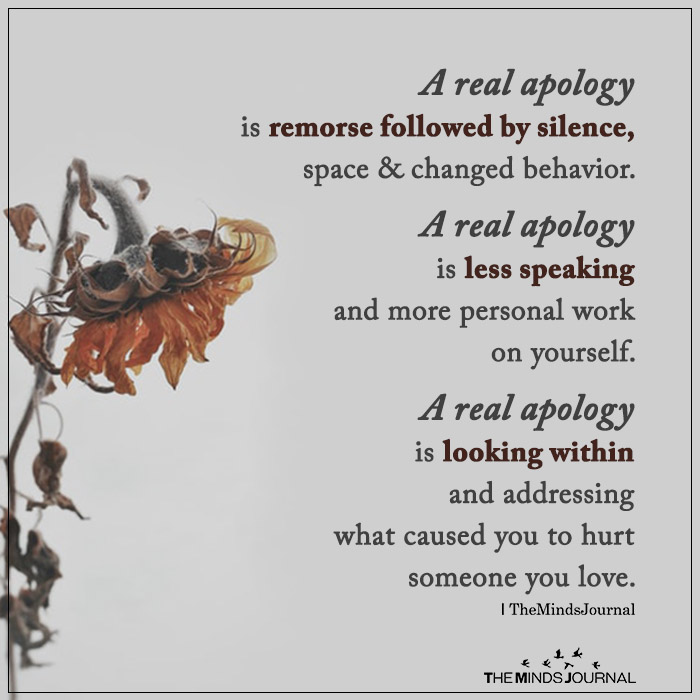
3. They don’t take any responsibility for their behaviors
“I am sorry you felt offended by that. It was just a joke.”
“I’m sorry that it made you feel that way.”
This is what a manipulative apology sounds like when the apologizer does not take any responsibility for their actions. Although each of us are allowed to feel the way we want, if someone is reluctant to apologize even after realizing that the other person is hurt, they are simply refusing to be accountable for their behaviors.
A genuine apology may sound like this – “I am sorry my comments were hurtful.”
A fake apology sounds like this – “I am sorry you got hurt by my comments.”
A fake apology makes the other person liable for their feelings, but not the manipulative person. Even if someone fails to understand why the other person may be hurt, a genuine apology is deserved. However, manipulators do not feel that way and will make you feel guilty for feeling the way you do.
Related: Why Men Struggle To Apologize
4. They apologize for themselves, not for you
“I am so sorry. I hope you can forgive me. I feel so bad.”
“I made a blunder. Can you ever forgive me?”
“I don’t know If I can see myself in the mirror if you don’t accept my apology and forgive me.”
When an apology sounds something like this, then it is more about how the apologizer feels, than how you are feeling. They will give you numerous explanations, justifications and reasons for their behaviors and actions.
The focus here is on their feelings of regret or guilt, not on your perspective, pain or emotions. A manipulative apology lacks empathy, compassion and kindness. And this is one of the most common signs of a manipulative apology.
Ill-suited apologies are made to cater to the gigantic egos that toxic individuals have, not to express how apologetic they are. Their fake “sorry” is designed to boost their self-esteem and self-image. Not to make you feel better. That’s why it stinks of deception, fakeness and manipulation.
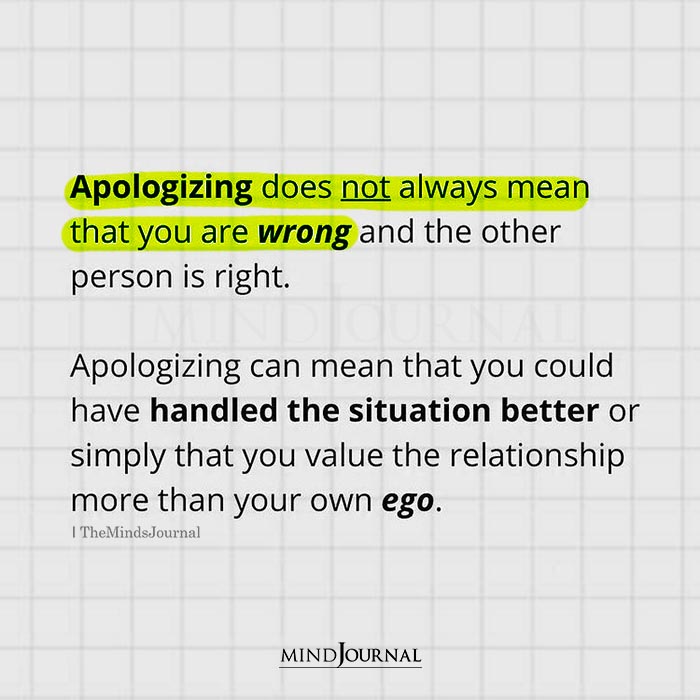
5. They don’t apologize, they bribe you
Some narcissists and toxic individuals may not apologize at all. They will never utter the word “sorry”, yet they will manipulate you and your emotions by giving you expensive gifts or things that you have been longing for.
Gifts can be romantic gestures and may be their love language, but it is simply a manipulation tactic when a heartfelt apology is due.
Regardless of what the gift is or how expensive it might be, buying a gift instead of apologizing honestly is like buying your emotions and opinions.
This form of a manipulative apology may be harder to identify as we may confuse it with an expression of regret, guilt and love. However, they are just being manipulative and gaining the higher ground without resolving the issue at hand.
“I am NOT sorry. I am just trying to control you.”
That is what a fake apology actually means. A manipulative apology can never be a genuine apology. It doesn’t have the weight of authenticity no matter how many times they say “sorry” to you. One of the strongest signs that someone is truly sorry is a change in their behavior.
You know their apology is authentic when they back it up with actual and lasting changes and improvements in their actions. However, an apology without any real, countable change is simply a form of manipulation.
They are not sorry for how you felt. They never were.
Related: Before You Apologize To Him or Her, You Must Know This
Once you learn to identify manipulative apology signs, you will be better able to learn how to respond to a manipulative apology. This will enable you to identify toxic people, invest in real relationships and better manage your emotional and mental health.
Frequently Asked Questions (FAQs):
How can you tell if an apology is real?
Some of the basic signs of a real apology are genuine regret, guilt, remorse and empathy. You can feel the other person realizes how much you are hurt and they promise to change by learning from their misdeeds. They willingly admit their mistake and feel bad for the pain they caused you.
How do you know if an apology is insincere?
A fake apology will lack empathy at its core. When their apology is insincere, it will come with conditions that shift the blame onto you. It is more of a statement that lacks any emotion, regret or empathy.
What is a passive aggressive apology?
It is a form of apology that is made only to appease and calm the offended person. It does not consider the feelings of the person and is targeted at ending the argument. A passive aggressive apology may sound like “I am sorry, but….”, where the “but” means the apologizer is not really sorry for what they have done.
What is an unconditional apology?
When someone offers you an unconditional apology, they say sorry from their heart without any excuses, justifications, reasons, explanations or conditions. They apologize for hurting you and learn from the incident without expecting an apology in return.
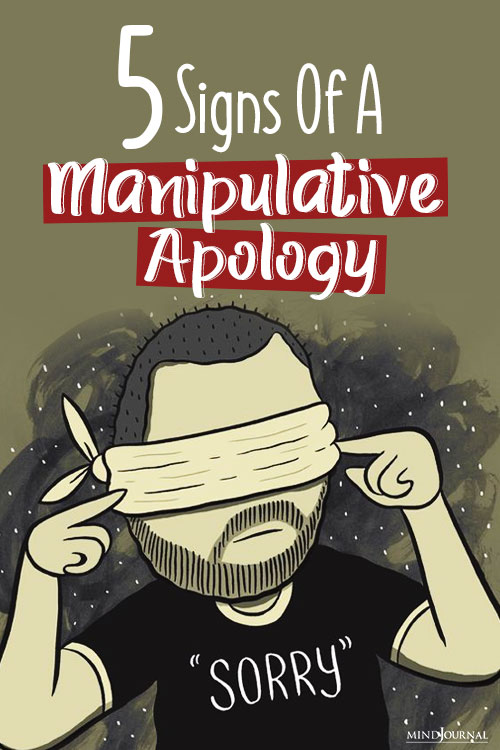
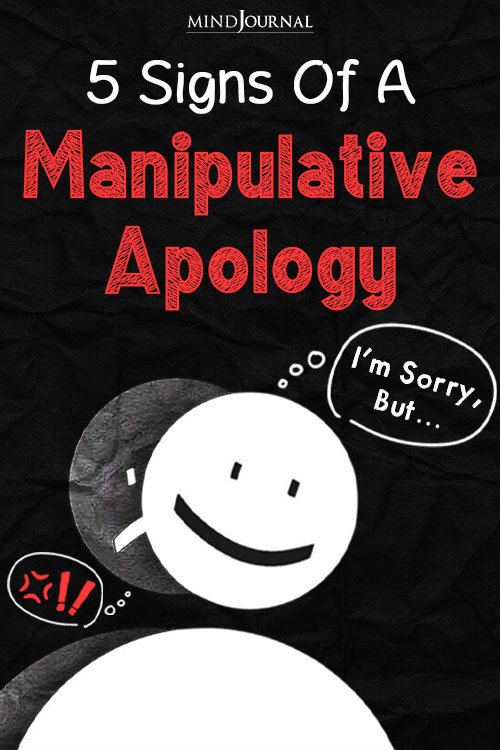


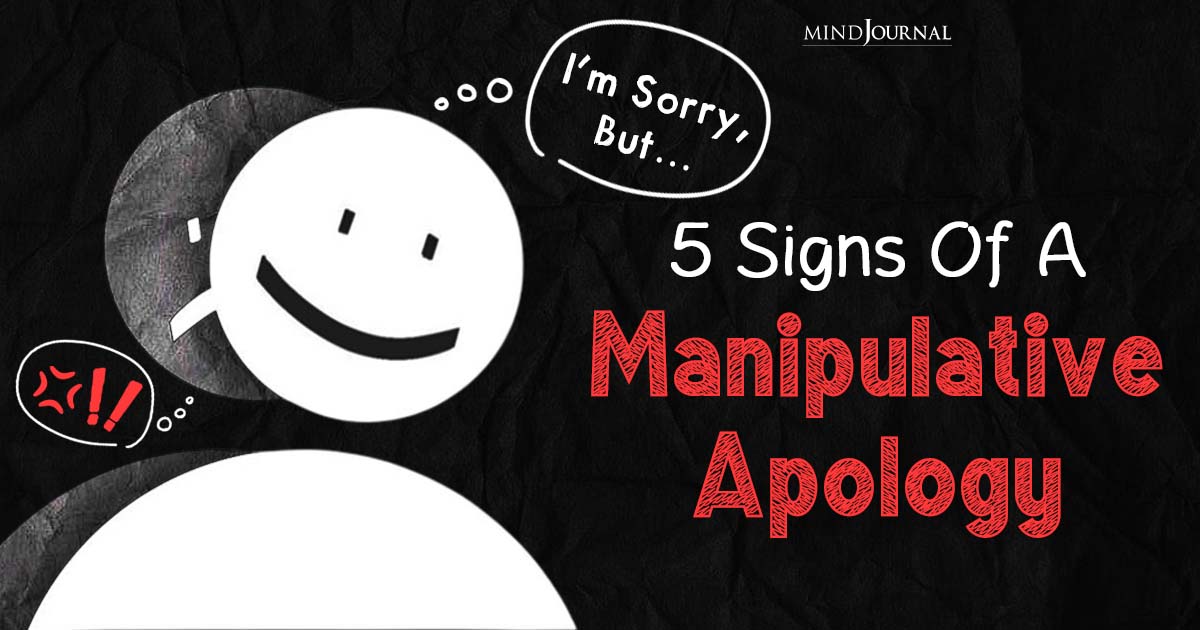







Leave a Reply